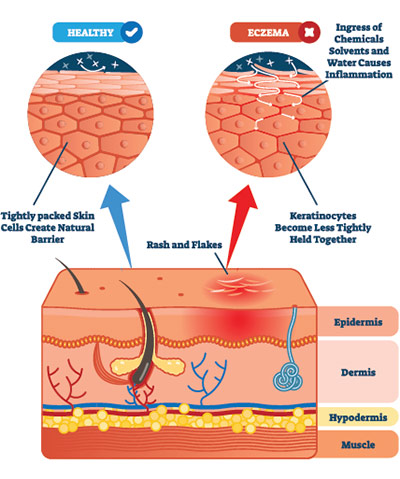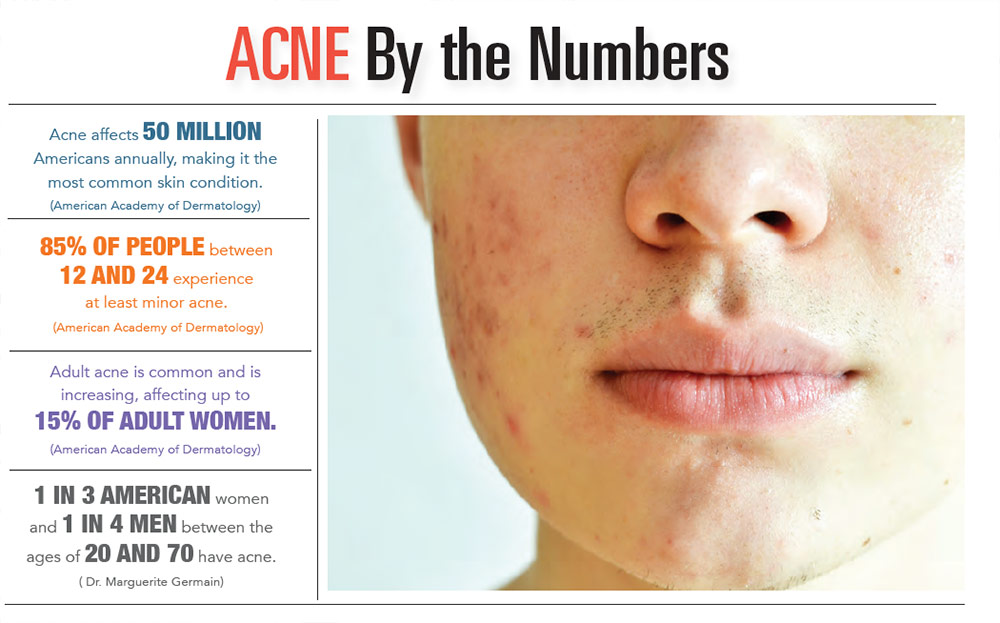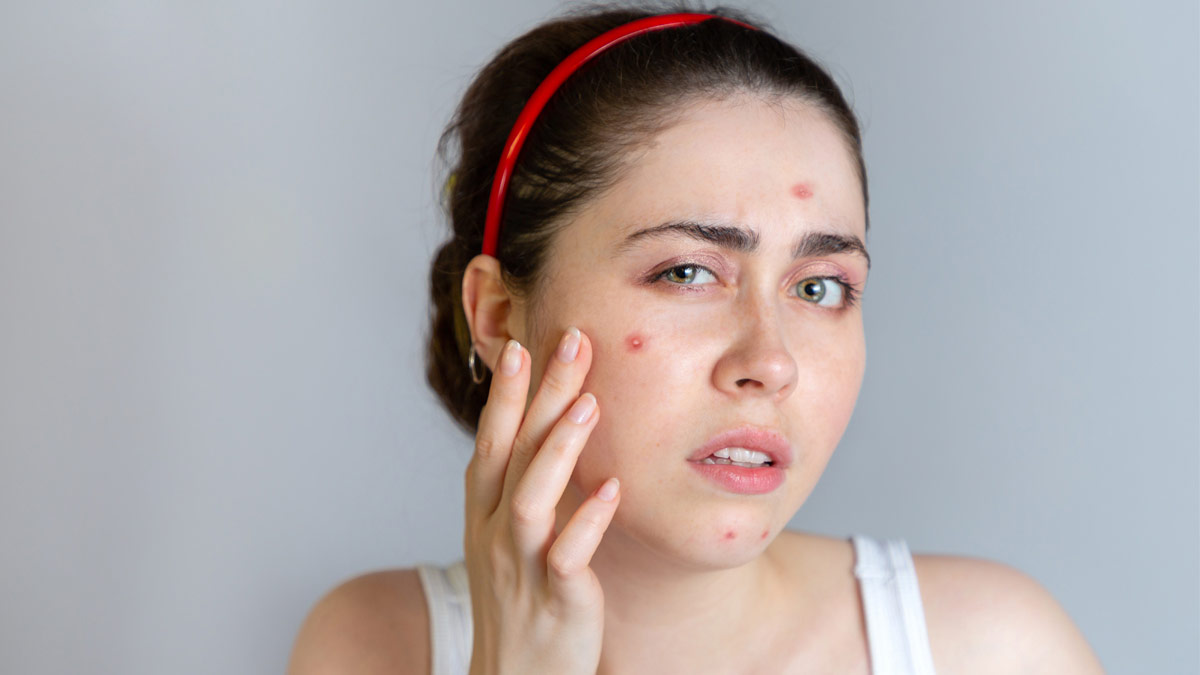Painful, unsightly blemishes on the face and body are something that most people associate with the teenage years. After all, the American Academy of Dermatology estimates that 85% of people ages 12 through 24 experience at least minor acne.
Sure, it can be a drag to have a pimple pop up the night before an event like senior class pictures or the prom, but the truth is that acne plagues lots of people well past their teenage years. In fact, 500 million Amercians annually are affected by this common skin condition.
“Adult acne is more common than you would think,” said Dr. Marguerite Germain, a board certified dermatologist at Germain Dermatologists in the Charleston area. “Acne is usually associated with adolescents, but 1 in 3 American women and 1 in 4 men between the ages of 20 and 70 have acne.”
Adult female acne occurs most commonly on the lower cheeks, jawline and chin and is often affected by the menstrual cycle, she added, while adult male acne is common on the face, the back and chest.
While milder cases of acne, which is an inflammation caused by overactive oil glands, can be treated by over-the-counter face cleansers and treatments, but not all acne is that easy to deal with. For patients who want to try something over-the-counter first, Dr. Germain suggested her patients look for facial cleansers that have 2% salicylic acid and glycolic acid.
If the skin doesn’t respond to those treatments, it might be time to let your dermatologist come up with a different plan.
When to See a Dermatologist
There’s no need to suffer if acne is contributing to low self-esteem, especially if you are experiencing cystic acne, which can cause lifelong scarring. After all, the best way to handle acne scarring is prevention.
Once scarring has occurred, some things can be done to minimize the problem, such as high-strength vitamin C serums, retinol products, microdermabrasion and chemical peels. But, as the saying goes, “an ounce of prevention is worth a pound of cure.”
“If acne outbreaks cannot be controlled, then definitely seek professional advice from a dermatologist,” Dr. Germain said. “All acne, whether mild or severe, can potentially cause scarring.“
Dermatologists can also help to identify any other underlying inflammatory conditions such as polycystic ovarian syndrome or other skin conditions that are sometimes confused with acne, rosacea and keratosis pilaris among them.
“When you feel like it’s time, it’s probably time,” said Dr. Germain. “Trust your inner voice.”
The Hormone Factor
Higher hormone levels during puberty are the main reason teenagers are so acne prone. And fluctuating hormone levels are often a contributing factor with adult acne as well, especially in women, said Dr. Leslie Poinsette, a board-certified dermatologist at Greenville Dermatology.
Since women experience hormone fluctuations around their periods, after discontinuing – or starting – birth control pills, during pregnancy, perimenopause and menopause, they are more likely to experience acne during these times.
Hormones associated with stress can also cause acne to be worse, Dr. Poinsette noted, so it’s not uncommon to see more acne pop up during the most stressful times of life. Maybe that’s why it’s so common to break out before a big life event.
“Hormones are a huge player in acne,” Dr. Poinsette said. “In response to stress, our bodies produce more androgens – a type of hormone. These hormones stimulate the oil glands and hair follicles in the skin, which can lead to acne. This explains why acne can be an ongoing problem when we find ourselves under constant stress.”
Common Acne Mistakes
Whether it’s because of confusing marketing messages or a misunderstanding of what causes acne, people make all kinds of mistakes when they try to treat their acne. Below are some of the most common errors.
Using the wrong products
“The biggest mistake I see is people trying to treat acne naturally with products that are not very effective, like tea tree oil,” Dr. Poinsette said. “There is a lot of science and evidence behind the class of medicine – retinoids – that we use to treat acne. They work.”
Too much scrubbing and washing
Acne starts under the skin with clogging of the pores, so you can’t just scrub it off.
Picking at it
While it can be so difficult to leave it alone, one of the worst things someone can do to pimples is pick at them, which can cause infection and lead to scarring.
Avoiding moisturizers
Dr. Germain said that many patients think that moisturizing their skin will contribute to clogged pores; however it’s necessary to moisturize, especially when you’re using prescription acne medications.
Not washing your hair enough
Many times, acne in adults is associated with seborrheic dermatitis of the scalp, said Dr. Germain. Even though this problem manifests itself as a scale, it is an oily scale. Therefore, not washing daily or every other day can worsen acne. Using a shampoo containing tar, zinc, ketoconazole or salicylic acid can help prevent breakouts.
Stopping treatment too soon
Sometimes it takes up to three months to see the results of using a new acne regimen. Also, prescription acne medications can sometimes make acne appear worse before it becomes better.
Myths and Truths About Acne
By Theresa Stratford
As common as acne is, there are just as many tips on how to get rid of it. But how true are all those pieces of advice? The best advice comes from a dermatologist. We sat down with John Hendrick, PA-C, of the Dermatology & Laser Center of Charleston to “clear up” – no pun intended – some of the post popular myths about the dreaded breakout.
MYTH #1: DIRTY SKIN CAUSES ACNE.
Hendrick: “Acne is not caused by dirt or uncleanliness. Acne is a multifactorial process. It includes clogging of the pore, overproduction of oil (sebum), overgrowth of bacteria in the pore and inflammation.”
MYTH #2: EXFOLIATION OF THE SKIN DOES NOT HELP ACNE.
Hendrick: “Exfoliation of the skin does help improve acne by removing the dead skin cells. There are mechanical exfoliators, which would include exfoliating brushes and other physical scrubs. There are also chemical exfoliators, which would include salicylic acid and glycolic acid.”
MYTH # 3: GREASY FOODS CAUSE ACNE.
Hendrick: “Consumption of greasy foods has little to no effect on acne. Eating foods with high oil content doesn’t mean that the oil will get from your digestive system to your pores.”
MYTH #4: POPPING PIMPLES IMPROVES ACNE.
Hendrick: “Popping pimples does not improve acne. In fact, popping a pimple often forces the bacteria deeper into the pore. The other concern with popping pimples is the potential increase in scarring. It is better to let a pimple run its course. Using benzoyl peroxide, salicylic acid or glycolic acid for spot treating would be more beneficial.”
MYTH #5: ONLY TEENAGERS GET ACNE.
Hendrick: “Although approximately 90% of teenagers will have at least some form of acne, at least 60% of adults will have acne at some point. This is often due to changes in hormone fluctuations.”
MYTH #6: YOU CAN MAKE YOUR PORES SMALLER.
Hendrick: “Pore size is determined through genetics. You cannot change the actual size of your pores, but you can change the appearance of the size of the pore. Exfoliating and keeping the face clean decreases dead skin buildup and oil, oftentimes making the pores appear smaller.”
Hendrick has been a physician assistant for 19 years, 14 in orthopedics and the past five in dermatology. He has previously worked with several dermatology groups in Virginia and North Carolina, including medical dermatology and Mohs surgery practices. He now works for the Dermatology & Laser Center of Charleston.
Eczema
 Eczema is another common skin condition that plagues millions of Americans. More than 30 million Americans have some kind of eczema, a skin irritation that usually causes red, dry, itchy patches of skin on the face, chest, inside the elbows, behind the knees and on the hands and feet.
Eczema is another common skin condition that plagues millions of Americans. More than 30 million Americans have some kind of eczema, a skin irritation that usually causes red, dry, itchy patches of skin on the face, chest, inside the elbows, behind the knees and on the hands and feet.
Eczema is especially common among children, and, while many kids eventually grow out of it, some will continue to suffer with eczema into adulthood. In fact, sometimes adults who have never had eczema will develop it as adults.
What makes eczema especially tricky is that it’s different for different people, so it can be difficult to treat.
No one knows exactly what causes eczema. It is not considered an allergy, but, since it’s an inflammation of the skin, some people have luck with an anti-inflammatory diet. This usually means eliminating triggers such as dairy, eggs, gluten and soy from the diet and seeing if there’s any improvement after several weeks.
It’s also important to pay close attention to the skin-care products and other things that touch the inflamed skin. Free and clear lotions, shampoos and laundry detergent are simple changes that can make a big difference for people with eczema.
Skin-care regimen is imperative for patients with eczema. Since it tends to be dry and scaly, it’s important to moisturize daily and make sure that baths and showers aren’t too long or that the water is not too hot or cold.
Home remedies like colloidal oatmeal baths, aloe vera gel, honey, apple cider vinegar and coconut oil have all been shown to help in some studies. Moderate to severe cases of eczema might require a prescription topical medication such as steroids, PDE4 inhibitors, topical calcineurin inhibitors and skin-barrier creams. No one formula works for everyone, so it often takes some trial and error to find the right treatment.
With help from your medical team, eczema can be managed.
By Erica Rodefer Winters








